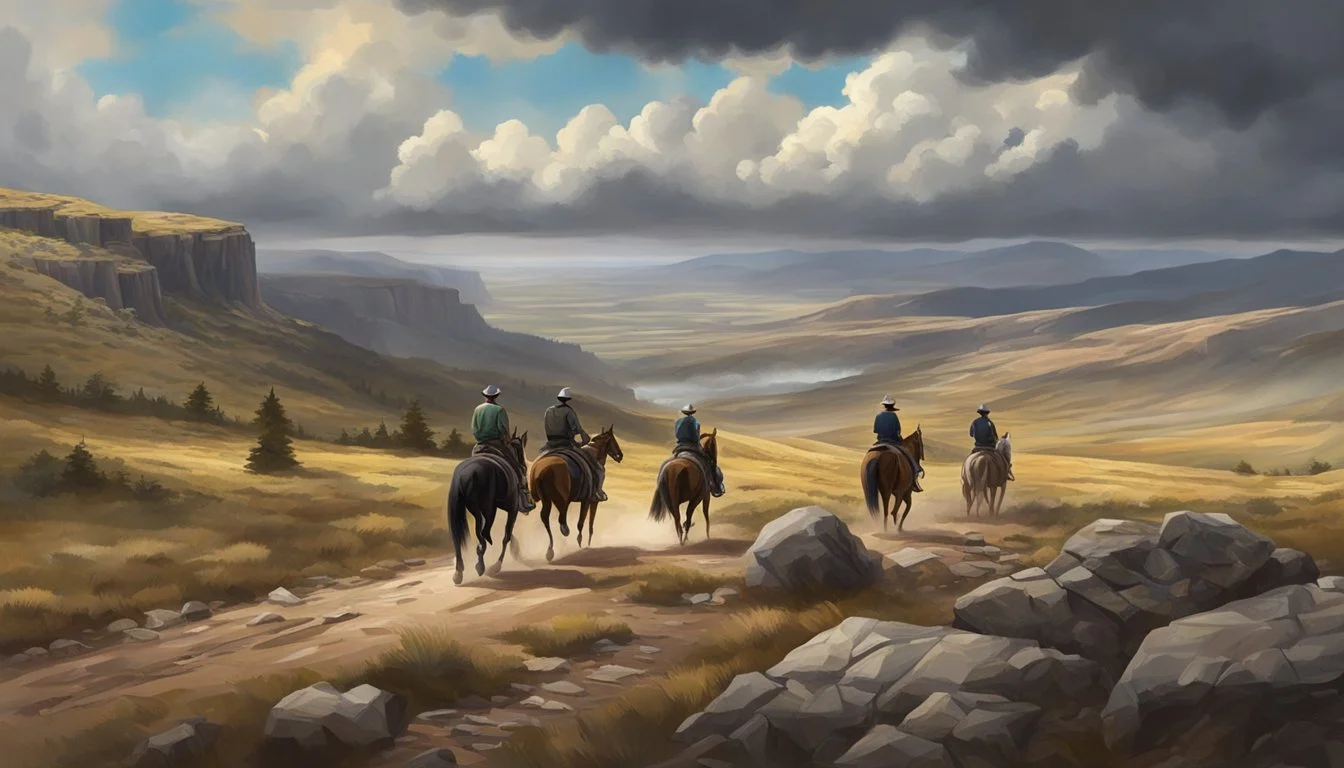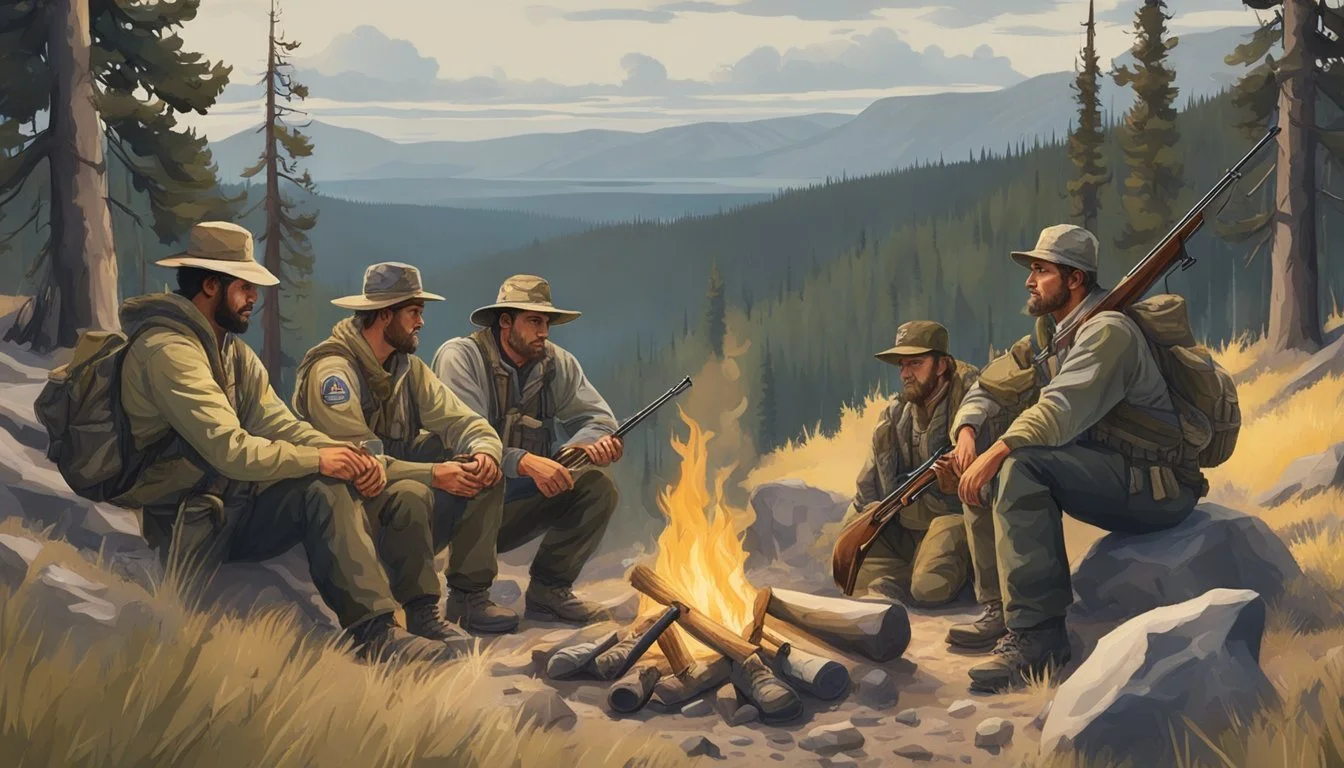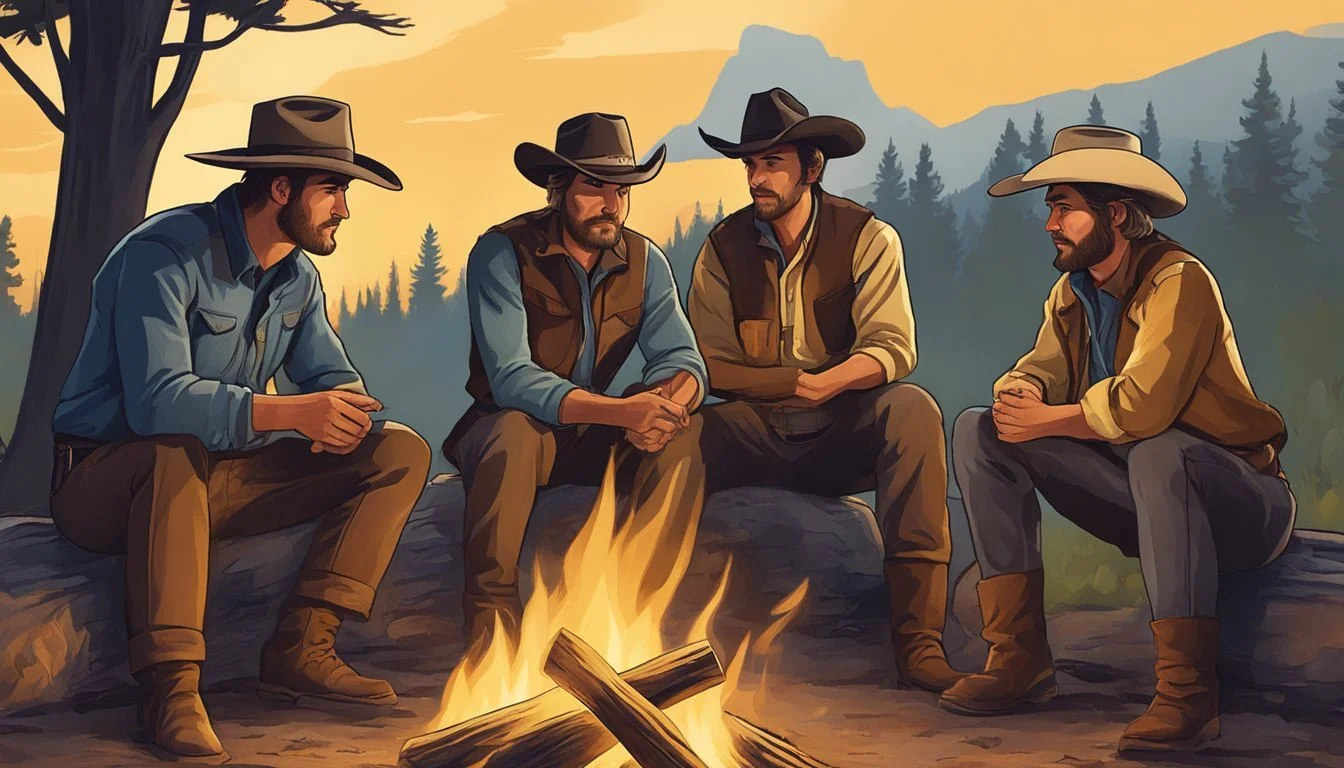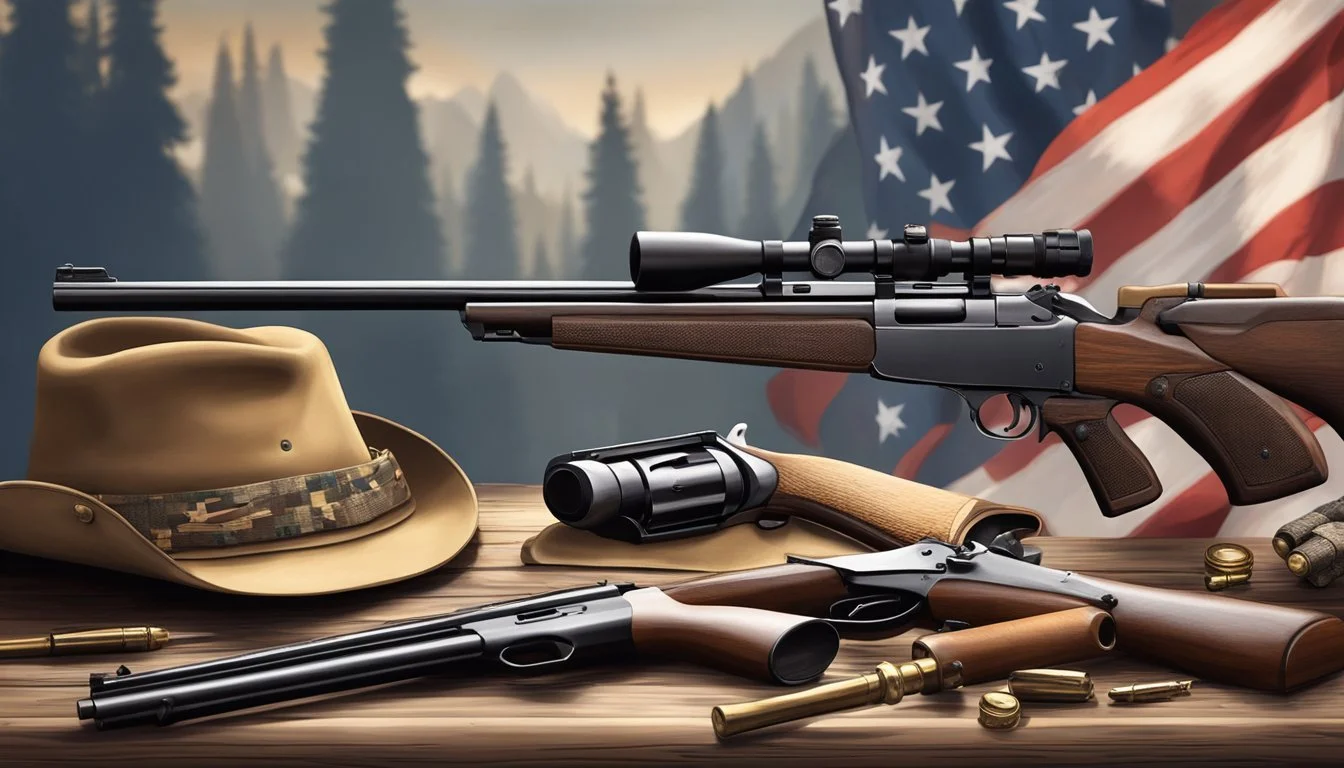Yellowstone Ignites Controversy Over Gun Culture and the Second Amendment Debate
Yellowstone, the hit television series, has captured audiences with its portrayal of ranch life in Montana. The show's depiction of gun culture and Second Amendment issues reflects broader debates in American society. Yellowstone presents firearms as integral tools for ranching, self-defense, and maintaining order in a rugged landscape.
The series, starring Kevin Costner, doesn't shy away from portraying characters exercising their right to bear arms. This representation aligns with traditional views of the American West, where guns were seen as necessary for survival and protection. Yellowstone's approach to firearms offers viewers a glimpse into a lifestyle where the Second Amendment holds practical significance beyond political rhetoric.
While some critics argue that the show glorifies gun use, others praise its realistic portrayal of firearms in rural American culture. Yellowstone's nuanced treatment of gun ownership and use provides a backdrop for broader discussions about the role of the Second Amendment in modern society. The show's popularity has brought these issues to prime time, sparking conversations among viewers about gun rights and responsibilities.
Yellowstone Series Overview
Yellowstone captivates audiences with its intense family drama and power struggles set against the backdrop of Montana's rugged landscape. The show explores themes of land rights, loyalty, and the clash between tradition and modernity.
Plot and Setting
Yellowstone unfolds on the vast Dutton Ranch in Montana, bordering Yellowstone National Park. The story centers on the Dutton family's efforts to protect their ancestral land from various threats. These include land developers, Native American tribes, and government entities.
The series masterfully weaves together elements of Western, drama, and political intrigue. It portrays the complex relationships between ranchers, Native Americans, and urban developers. The breathtaking Montana scenery serves as more than just a backdrop, often becoming a character in its own right.
Cultural Impact
Yellowstone has sparked renewed interest in Western-themed entertainment and Montana's cowboy culture. The show's popularity has led to increased tourism in the region where it's filmed.
It has also ignited discussions about land rights, conservation, and the changing face of the American West. The series doesn't shy away from controversial topics, addressing issues like tribal sovereignty and corporate influence in rural areas.
Yellowstone's portrayal of gun culture and Second Amendment rights has drawn both praise and criticism. It reflects the ongoing national debate about firearms in American society.
Main Characters
John Dutton, played by Kevin Costner, is the patriarch of the Dutton family and owner of the largest contiguous ranch in the United States. He's a tough, principled rancher determined to preserve his family's legacy.
Beth Dutton, John's daughter, is a sharp-tongued, ruthless businesswoman fiercely loyal to her family. Her complex relationship with her father and brothers forms a central part of the series' drama.
Thomas Rainwater, the chief of the nearby Native American reservation, often clashes with the Duttons over land and water rights. His character adds depth to the show's exploration of modern Native American issues.
Monica, married to one of John's sons, provides a bridge between the Dutton family and the Native American community. Her character struggles with balancing her heritage and her new family ties.
Historical Context of Gun Culture in Yellowstone
The gun culture depicted in Yellowstone has deep roots in the American West's history. Firearms played a crucial role in shaping the region's development and continue to hold symbolic significance today.
Gun Culture in American West
Guns were essential tools for early settlers in the American West. They provided protection from wildlife and hostile threats. Firearms also enabled hunting for food and pelts. As ranching grew, guns became vital for protecting livestock from predators.
The Second Amendment reinforced the importance of gun ownership. It guaranteed citizens the right to bear arms. This constitutional protection became deeply ingrained in Western culture.
Marksmanship was highly valued. Shooting competitions and exhibitions were common social events. Gun proficiency was seen as a practical skill and a source of pride.
Historical Significance of Firearms
Firearms symbolized self-reliance and personal responsibility in the West. The ability to defend oneself and one's property was crucial in remote areas. Law enforcement was often scarce, making guns necessary for security.
Guns were tools of survival and commerce. Hunting provided food and income from fur trading. Ranchers used firearms to protect their herds from predators and rustlers.
The gun's role in Western expansion is complex. While enabling settlement, it also contributed to conflicts with Native Americans. Firearms became symbols of power and authority in frontier societies.
Today, guns remain culturally significant in many Western communities. They represent heritage, independence, and a connection to the region's rugged past.
Second Amendment Representation
The Yellowstone series portrays complex perspectives on gun rights and ownership. Characters express varying views shaped by their backgrounds and experiences within the show's rural Montana setting.
Interpretations within the Show
Yellowstone depicts firearms as integral to ranch life and Western culture. Characters routinely carry and use guns for protection, hunting, and managing livestock. The show presents gun ownership as a practical necessity for those living in remote areas. It also ties firearms to themes of self-reliance and traditional values. Some scenes showcase responsible gun use and safety practices, while others highlight potential dangers of misuse.
Character Perspectives on Gun Rights
Key characters articulate diverse stances on Second Amendment issues. John Dutton views gun ownership as an essential right tied to preserving his family's way of life and protecting their land. Kayce Dutton's military background informs his skilled but cautious approach to firearms. Beth Dutton expresses more ambivalence, recognizing guns as tools but questioning their prominence in Montana culture. Native American characters offer additional perspectives, often viewing firearms through the lens of sovereignty and self-determination.
The Influence of Taylor Sheridan
Taylor Sheridan's impact on "Yellowstone" and modern Western dramas is profound. His unique creative vision and personal ideals shape the show's portrayal of gun culture and Second Amendment issues.
Sheridan's Creative Vision
Taylor Sheridan's approach to "Yellowstone" blends traditional Western elements with contemporary themes. He crafts complex characters and intricate storylines that explore moral ambiguity and power dynamics.
The series showcases firearms as integral tools in the characters' lives, reflecting the real-world significance of guns in rural American culture. Sheridan's attention to historical accuracy in weaponry, as seen in the prequel "1883", adds authenticity to his storytelling.
His writing emphasizes the practical uses of firearms for protection, hunting, and as symbols of independence. This nuanced portrayal avoids simplistic pro-gun or anti-gun narratives, instead presenting a more realistic depiction of gun ownership in the modern West.
Reflection of Sheridan's Ideals
Sheridan's background and personal beliefs heavily influence "Yellowstone's" themes. His characters embody values of self-reliance, family loyalty, and hard work - principles often associated with gun rights advocates.
The show depicts firearms as essential for protecting property and loved ones, mirroring arguments made by Second Amendment supporters. Sheridan's characters frequently face threats that require armed responses, reinforcing the idea of guns as necessary tools.
His storytelling also explores the responsibilities and ethical considerations of gun ownership. Characters grapple with the consequences of their actions, highlighting the weight of wielding such power.
This balanced approach reflects Sheridan's nuanced understanding of American gun culture, neither glorifying nor demonizing firearms but presenting them as complex elements of rural life.
Audience Reception and Viewership
Yellowstone has achieved remarkable success in terms of viewership and cultural impact. The show's portrayal of gun culture and Second Amendment issues has resonated with a wide audience.
Ratings and Achievements
Yellowstone has consistently delivered strong ratings since its debut. The series premiere in 2018 drew 2.8 million viewers, setting a record for the Paramount Network. Subsequent seasons saw even higher numbers.
Season 4's finale in 2022 attracted over 9 million viewers, making it cable's most-watched show. This achievement surpassed even popular series like HBO's Succession.
The show's success extended to streaming platforms, with millions of additional viewers tuning in through Paramount+. Yellowstone's popularity remained strong despite the pandemic, providing entertainment for audiences during lockdowns.
Cultural Resonance
Yellowstone has become a cultural phenomenon, sparking discussions about rural American life and gun culture. The show's nuanced portrayal of firearms as both tools and symbols has appealed to viewers across the political spectrum.
Celebrity fans and high-profile premieres have further elevated Yellowstone's status. The series has garnered critical acclaim, earning Emmy nominations for its authentic portrayal of Western life.
Yellowstone's impact extends beyond entertainment, influencing fashion trends and tourism to filming locations. The show's depiction of gun ownership and use has contributed to broader conversations about the Second Amendment in American society.
The Political and Social Landscape
Yellowstone portrays a complex tapestry of political ideologies and social issues against the backdrop of rural Montana. The show delves into power dynamics between various factions while exploring hot-button topics relevant to modern American society.
Representation of Political Ideologies
Yellowstone depicts a range of political viewpoints, from conservative ranchers to progressive environmentalists. The Dutton family embodies traditional values and a fierce defense of their land, reminiscent of MAGA rhetoric. Big business interests clash with local landowners, highlighting tensions between corporate power and individual rights.
The show's portrayal of Native American characters adds nuance to discussions of cultural identity and historical injustice. This representation challenges simplistic political narratives and forces viewers to confront complex realities.
Gun ownership features prominently, with characters frequently wielding firearms. This reflects the strong Second Amendment culture prevalent in rural America, particularly in states like Montana and Texas.
Addressing Contemporary Issues
Yellowstone tackles pressing social concerns through its storylines. Land rights and conservation efforts take center stage, mirroring real-world debates over resource management and environmental protection.
The series explores the cultural divide between urban and rural America. Characters grapple with changing demographics and economic pressures, echoing anxieties felt in many small towns across the country.
Racial tensions and the legacy of colonialism are addressed through conflicts between Native American tribes and white landowners. These plotlines touch on elements of critical race theory without explicitly naming the concept.
As prestige TV, Yellowstone uses its platform to spark discussions about power, privilege, and the evolving nature of the American West. The show's popularity has made it a cultural touchstone for exploring these contentious issues.
Spin-offs and Their Influence
Yellowstone's spin-off series expand the Dutton family saga across different time periods, offering new perspectives on gun culture and Second Amendment issues. These shows explore how firearms shaped the American West and continue to influence modern ranching life.
1883: Origins and Connections
Set in the late 19th century, "1883" portrays the earliest days of the Dutton family's journey westward. Firearms play a crucial role in survival and protection during this dangerous era. The show highlights the necessity of guns for self-defense against bandits and wildlife. It also explores the moral complexities of gun ownership and use in a lawless frontier.
Characters in "1883" rely heavily on rifles and revolvers, showcasing period-accurate weapons like the Winchester 1873 and Colt Single Action Army. The series draws parallels between the Second Amendment's original intent and the realities of life in the untamed West.
1923: Continuations and Differences
"1923" bridges the gap between "1883" and the original Yellowstone series. Set during Prohibition and the Great Depression, it shows how gun culture evolved in the early 20th century. The show depicts the Dutton family's continued reliance on firearms for ranch management and protection.
This spin-off explores changing attitudes towards gun ownership as law enforcement becomes more established. It also touches on the impact of World War I veterans returning home with combat experience and new perspectives on firearms.
"1923" features a mix of Old West revolvers and more modern bolt-action rifles, reflecting the transitional period in American gun culture.
6666: Exploring New Horizons
"6666" shifts focus from Montana to Texas, offering a fresh take on modern ranching and gun culture. Set on the legendary Four Sixes Ranch, this spin-off examines how firearms remain integral to large-scale cattle operations.
The show explores regional differences in gun laws and attitudes between Montana and Texas. It highlights the role of firearms in wildlife management, predator control, and competitive shooting sports popular in ranch communities.
"6666" also addresses contemporary Second Amendment debates, including concealed carry laws and the use of modern sporting rifles in ranching applications.
Cultural References and Symbolism
"Yellowstone" draws heavily on American cultural touchstones and symbolic imagery to craft its narrative. The show blends traditional Western archetypes with modern melodramatic elements, creating a unique viewing experience that resonates with audiences.
Western Genre and Archetypes
The series taps into classic Western tropes, featuring rugged cowboys, vast landscapes, and conflicts over land and resources. John Dutton embodies the stoic rancher archetype, fiercely protecting his family's legacy. The Yellowstone Ranch represents a romanticized vision of the American West, standing as a bulwark against encroaching modernity.
Gunplay features prominently, echoing Hollywood's long tradition of Western shootouts. The show's characters often resolve disputes through armed confrontation, reflecting the genre's emphasis on individual justice and self-reliance.
Melodrama and Viewer Engagement
"Yellowstone" employs melodramatic storytelling techniques to heighten viewer engagement. Family conflicts, power struggles, and romantic entanglements drive the plot forward. The show's heightened emotions and dramatic confrontations echo the soap opera format, albeit in a Western setting.
This blend of genres allows "Yellowstone" to explore contemporary issues through a familiar lens. The series tackles themes of land rights, Native American relations, and changing rural economies, couching these discussions in entertaining, high-stakes narratives.
By combining Western imagery with melodramatic storytelling, "Yellowstone" creates a world that feels both nostalgic and relevant to modern audiences. This approach has helped the show cultivate a devoted fanbase and spark discussions about American values and identities.
Character Studies
Yellowstone's main characters embody complex relationships with guns and power. Their portrayals explore how firearms intertwine with family, legacy, and survival in the modern American West.
John Dutton: The Patriarch
John Dutton, played by Kevin Costner, stands as the unwavering patriarch of the Dutton family. His character epitomizes the traditional Western rancher, fiercely protective of his land and legacy. John's relationship with firearms is pragmatic and deeply rooted in his way of life.
He views guns as tools essential for ranch operations and self-defense. John's stance on gun ownership aligns closely with Second Amendment rights, seeing it as a fundamental aspect of preserving his family's way of life against external threats.
The character's gun use is portrayed as measured and purposeful, reflecting his overall approach to power and control. Through John, the show explores themes of tradition, property rights, and the tensions between individual freedoms and changing societal norms.
Beth Dutton: Power and Romance
Beth Dutton, portrayed by Kelly Reilly, presents a complex relationship with firearms and power. Unlike her father, Beth's connection to guns is less direct but no less potent. Her character wields power through intellect and manipulation rather than physical force.
Beth's romantic relationship with Rip Wheeler adds layers to her character's interaction with gun culture. While she may not frequently handle firearms herself, she understands and accepts their role in the ranch's operations and her family's lifestyle.
Her character challenges traditional gender roles in the Western setting, showcasing a woman who can be both ruthless in business and deeply passionate in her personal life. Beth's storylines often touch on the psychological impacts of violence and power dynamics within the family.
Rip Wheeler: Loyalty and Depths
Rip Wheeler embodies unwavering loyalty to the Dutton family, particularly to John and Beth. His character's proficiency with firearms stems from both necessity and his role as the ranch's enforcer. Rip's gun use is often portrayed as an extension of his dedication to protecting the Dutton legacy.
The show explores Rip's complex past and how it shapes his present actions. His relationship with guns is portrayed as a mix of skill and burden, highlighting the emotional toll of violence even when deemed necessary.
Rip's romance with Beth adds depth to his character, showcasing a softer side beneath his tough exterior. Through Rip, Yellowstone examines themes of found family, redemption, and the moral ambiguities surrounding gun use in defense of loved ones and property.
Impact of Gun Culture on the Dutton Family
The Dutton family's relationship with firearms reflects the deep-rooted gun culture of the American West. Guns serve as tools for protection, ranching, and conflict resolution on their vast Montana property.
Ranching and Protection
Firearms are essential tools on the Yellowstone Ranch. The Duttons use guns for predator control, protecting livestock from wolves and bears. Hunting also plays a significant role in their lifestyle, both for sustenance and recreation.
John Dutton often carries a lever-action rifle, symbolizing the ranch's traditional values. This firearm choice connects the family to their frontier heritage and the Second Amendment rights they fiercely defend.
The ranch hands are trained in firearm use, emphasizing safety and skill. This preparedness is crucial for defending the property from various threats, including trespassers and rival ranchers.
Conflict and Resolution
Guns frequently factor into the Duttons' conflicts with outsiders. John Dutton has used firearms to confront trespassers and protect his land rights. This approach sometimes leads to tense standoffs, highlighting the complex relationship between gun ownership and property disputes in Montana.
The family's reliance on firearms for conflict resolution reflects broader debates about gun rights and self-defense. Chief Rainwater, representing Native American interests, often clashes with the Duttons over land ownership, bringing cultural and historical perspectives to these armed confrontations.
Gun use in the show raises questions about the line between necessary protection and excessive force. The Duttons' actions sometimes blur legal and ethical boundaries, sparking discussions about responsible firearm ownership and its place in modern ranching life.







